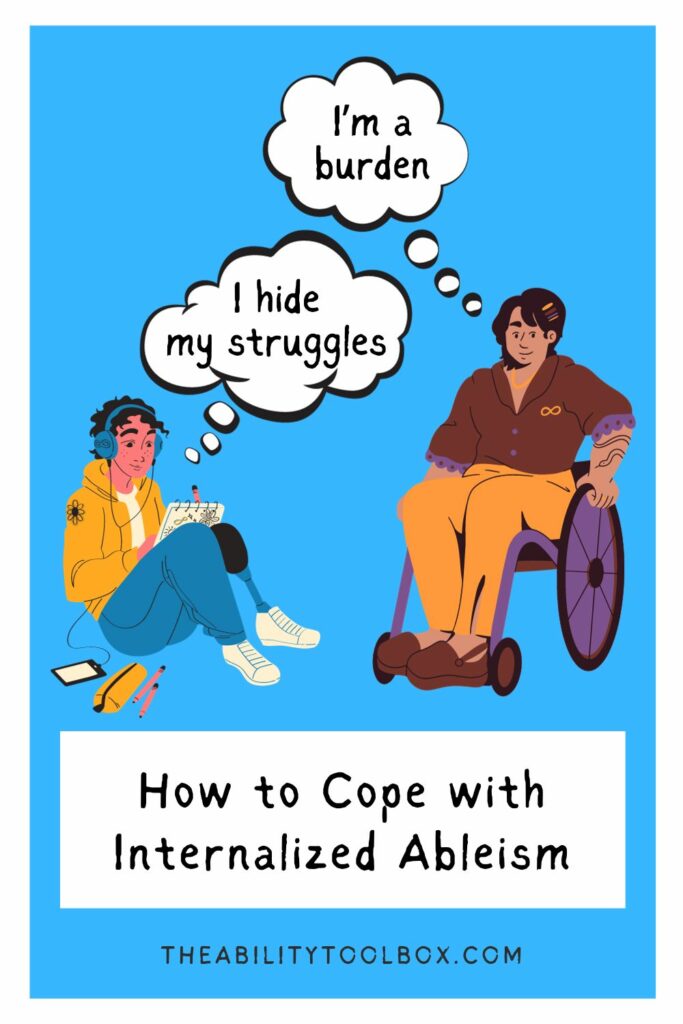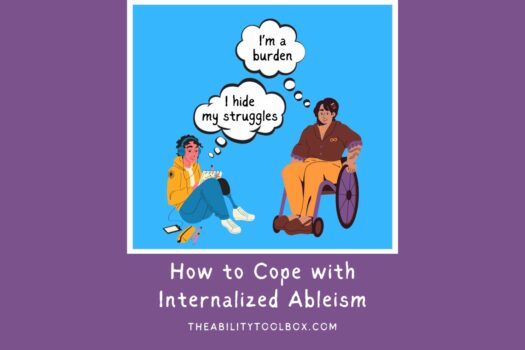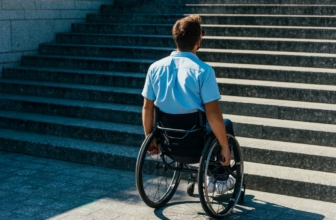If you're a disabled person who feels shame about your condition and struggles to ask for help or advocate for your rights, you may be battling one of the toughest enemies you'll face in life with a disability — internalized ableism.
What is internalized ableism?
Internalized ableism is when disabled people believe negative attitudes, stereotypes, and societal prejudices about disabilities. Internalized ableism is also known as self-stigma, especially when referring to people with mental illness.
Whether we are born disabled or develop a disability later in life, we spend our lives surrounded by ableism and sanism. We encounter ableist beliefs, hear ableist comments, and deal with systemic ableism in businesses, organizations, and government programs. Therefore, it's not surprising that we may internalize those biases and feel bad about ourselves.
Every disabled person struggles with internalized ableism to some degree. Either we're born disabled and must grow up dealing with ableism, or we've become ill or injured after years of absorbing and possibly even perpetuating ableist attitudes and stigmas. Internalized ableism is intersectional, so it can manifest in different ways depending on a person's race, ethnic background, gender, orientation, and how their disability affects their ability to conform to the expectations of their culture and community.
Examples of Internalized Ableism and Self-Stigma
Here are some examples of common thoughts and beliefs that are rooted in internalized ableism and self-stigma.
Identity Struggles
Internalized ableism can make it difficult to accept your disability and seek support and services. You may struggle with:
- Not wanting to describe yourself as disabled because you believe disability is a bad thing.
- Feeling like you're not “disabled enough” to need a program or service.
- Feeling embarrassed to be around other people with disabilities.
- Constantly wishing you were not disabled or mentally ill to the point that it interferes with your ability to move forward in life.
Hiding
You may be experiencing internalized ableism and self-stigma if you try to conceal or minimize your disability to the point that it harms you or limits your life unnecessarily. Common signs include:
- Avoiding using disability parking spaces because you worry about how others will react.
- Staying home because you're embarrassed to use a mobility aid.
- Masking your stimming, special interests, or other neurodivergent traits.
- Hiding your diagnosis from family and close friends.
- Not asking for help because you're worried about inconveniencing others.
- Not inviting family/friends over because your home is messy and you're embarrassed to ask for help.
Shame
Internalized ableism and mental illness self-stigma often lead to feelings of shame, including:
- Calling yourself a burden.
- Feeling ugly or worthless.
- Hating your body due to physical limitations or scars.
- Learned helplessness: Giving up on having a better life because you've tried many times and nothing worked
- Frequently comparing yourself to others.
- Feeling like a failure due to your disability.
- Underestimating your own potential.
- Living up to low expectations set for you by others despite being capable of doing more.
- Self-hatred due to not being able to fulfill the expectations of your family or culture to pursue a particular career, have children, etc.
- Going off of mental health medications against medical advice because of shame over needing them.
- Not dating, or staying in an unhappy or abusive relationship because you believe no one will want you.
Anger
Internalized ableism can lead to frustration, bitterness, and anger toward yourself and others, manifesting as:
- Becoming trapped in self-pity and raging at the world.
- Expressing jealousy toward abled people as a whole or other people with disabilities because you think they have it easier than you.
- Begrudging younger people with disabilities because you believe life is a bit easier for them. “I had to wheel 5 miles to school — uphill, both ways!”
- Judging and mocking other disabled people based on ableist stereotypes.
- Defending others for discriminatory and ableist behavior, making excuses for inaccessible businesses, or denying the severity of systemic ableism.
- Hostility toward other marginalized people, such as people of color and the LGBTQ+ community. Playing “Oppression Olympics” about whose struggles are harder.
Tips for Overcoming Internalized Ableism
Working through self-stigma and internalized ableism is a lifelong process. Here are a few tips to help you navigate the minefield.
Practice Self-Care
One of the best ways to process internalized ableism is to work on loving and accepting yourself. These ideas can get you started:
- Be kind to yourself. All disabled people struggle with internalized ableism and self-stigma. Forgive yourself for any harm you've caused yourself in the past so you can move forward.
- See a therapist. Therapy can help you process grief surrounding your disability and living in an ableist society.
- Consider group counseling, where you can learn from others and feel less alone in your struggles with self-stigma.
- Use meditation and mindfulness techniques to help yourself calm down when anger is getting the better of you.
- Engage in self-care activities and hobbies that don't cost much or tire you out.
- Shop for clothes you like that work with your physical or sensory needs while being fashionable.
- Decorate your mobility aids and medical devices to reflect your style and personality. Our guide to wheelchair accessories has lots of ideas, many of which also work great for canes and rollators.
Recognize Your Limitations and Abilities
Internalized ableism often leaves us feeling like we're worthless and can't do anything or are useless if we can't do everything. Neither of those things are true. Here are some ways to remind yourself that you're strong and capable:
- Forgive yourself when you make mistakes. No one is perfect.
- Yoda was wrong. Trying your best matters even if you fail. It can help you find new, creative ways of doing things.
- Work on asking for help and support when you need it and not feeling guilty about it.
- Remind yourself that human beings are a social species and helping each other is natural. Even Neanderthals cared for disabled and elderly members of their tribes. You are not a burden.
- Focus on interdependence rather than independence. Remember that you have needs, but you also have a lot to give.
Find Role Models and Understanding Peers
If you struggle with negative feelings about your disability, chronic illness, or mental illness, connecting with others who understand and who have built successful lives can help you work through this aspect of self-stigma. Try these tips:
- Join online disability support groups, Facebook groups, and/or subReddits to connect with other disabled people.
- Join a local support group for people with your condition or people with a variety of disabilities.
- If you have a mental health condition, the National Alliance on Mental Illness (NAMI) has support groups in major cities and small towns around the country that are focused on helping you battle self-stigma and develop coping skills.
- Read about successful people who have the same disability or mental illness as you — not necessarily celebrities who have financial privilege, but scientists, businesspeople, lawyers, writers, artists, etc. You may find hope and practical ideas from learning about their stories.
- Read about disability history to understand the roots of internalized ableism.
Become an Advocate
If you want to help defeat internalized ableism and self-stigma, consider becoming a disability rights advocate in your local community and beyond. Here's how to get started:
- Volunteer with your local independent living center, ADAPT chapter, NAMI chapter, or other disability advocacy group.
- Pursue professional education or training to become a peer expert who can help others through your career or advocacy work.
- Think about advocacy as fighting for a better future so younger generations won't have to go through what you did.
- If you're also part of a marginalized or minority group, start a support group for people with disabilities in your community to discuss your unique challenges.
People with disabilities often view ableism as an external force we must continually fight against, but we must also recognize that ableism and stigma exist within us. We must confront and address our internalized ableism to create lasting change for the disability community.
How do you work through internalized ableism and self-stigma?
Share your experiences with our safe and supportive community in the comments below.

Founder and Editor-in-Chief of The Ability Toolbox. I received my BA in English from Stanford University and MA in Clinical Psychology from Antioch University Los Angeles, and have worked in entertainment and health media for over 20 years. I also blog about traveling with a disability. As a wheelchair user with cerebral palsy, I am deeply committed to amplifying the voices of the disability community through writing and advocacy.








Start the discussion at community.theabilitytoolbox.com